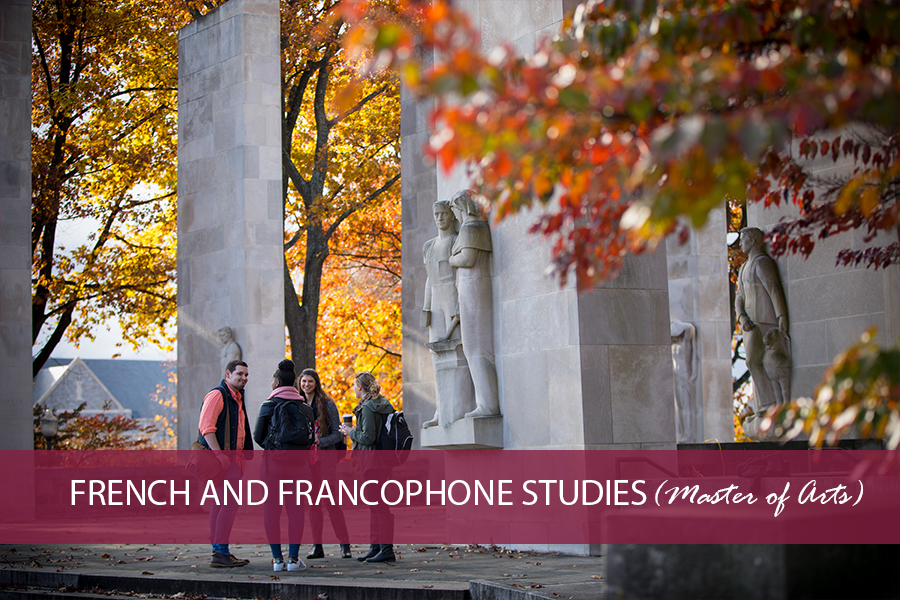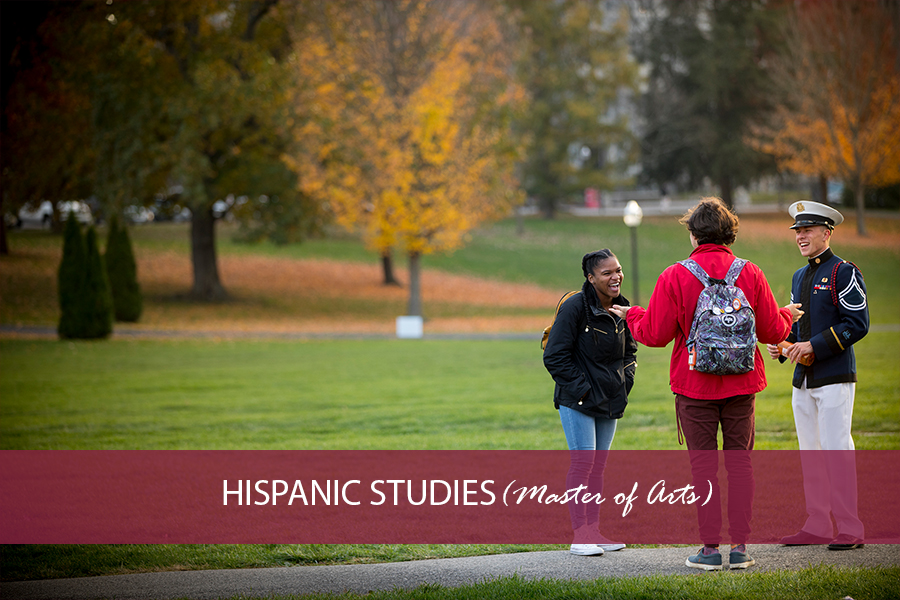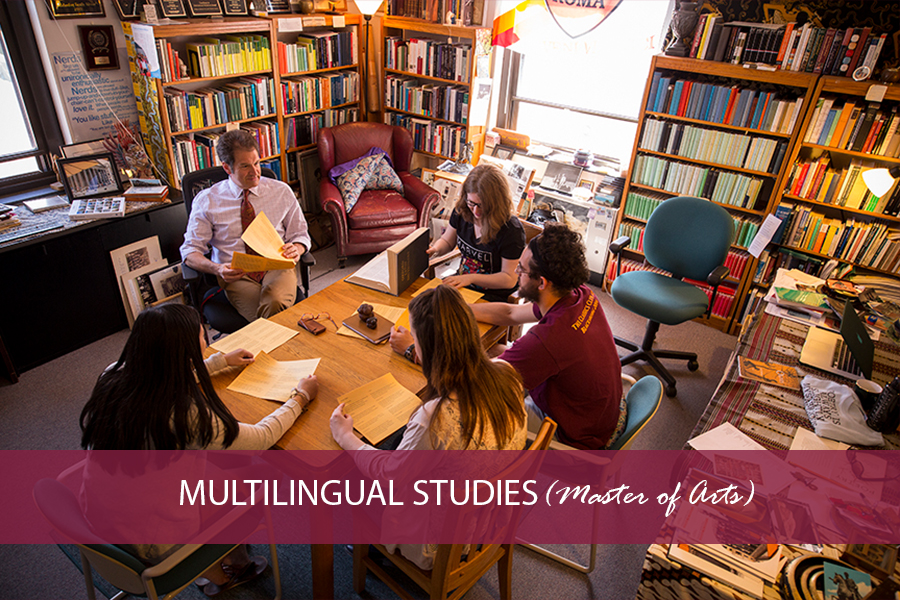Spanish Online Courses
Insert your title here
- Your title here
- Your text here
Advance your knowledge — advance your career.
Graduate Online/On-Campus Courses in Hispanic Studies
Course Title: Scientific Fictions of 19th- and 20th-century Spanish America
Course Code: SPAN-5344, CRN: 20125 (On Campus) CRN: 20127 (Online/Virtual Class EST)
Credit Hours: 3
Instructor: Elisabeth L. Austin, Associate Professor of Spanish
Campus Location: Blacksburg and Online (Virtual)
Semester: Spring (Current Timetable of classes)
Restrictions: Available to ALL Classes
Tuition Rates: $842.50 (per credit) Virginia Residents, $1,642.25 (per credit) Non-Virginia Residents See Current Rates and Reduced Tuition for K-12 Teachers in VA Here
Description: This is a special topics, variable content course that allows the students to explore different geographical regions of Spanish America and the ways that authors have used literature to preserve, recreate, revise, subvert, and even contradict their countries' official history. All discussion conducted in Spanish. May be repeated for credit up to three times. Pre: minimum oral proficiency of "Advanced" on the ACTFL scale; and graduate standing. Current Topic: How does science influence literature? How does technology change the book? How do local cultures participate in transcontinental philosophical shifts? This course explores these questions as it examines the profound influence that scientific discourse had on cultural production in Spanish America in the late 19th and early 20th centuries. In the first part of the course, we will read short novels and stories by authors including Clorinda Matto de Turner, Eduardo Holmberg, and Carlos Octavio Bunge, who examine questions of nation and race from Positivistic and Social Darwinistic perspectives. In the second part of the course, we will read short stories and novels by authors such as Adolfo Bioy Casares, Jorge Luis Borges, Horacio Quiroga, Leopoldo Lugones, Julio Cortázar, Carlos Fuentes, and Gabriel García Márquez, whose works reveal and probe fears of modernization and technology. Class discussions will touch on issues of race, nation, modernity, technology, and humanity. Literary readings will be paired with critical theory and historical texts. Students will give presentations, write several short papers, and research and write a longer final paper. Graduate standing required. Meets R 4-7. (3H, 3C).
What do you need to apply for Non-degree Programs?
- Bachelor’s degree from an accredited college or university with minimum of 3.0 GPA. Include scanned copy of your college transcripts with your online application, then you may need to arrange for an official copy to be sent to us after you receive an offer of admission.
- TOEFL or IELTS (For all non-U.S. citizens or non-U.S. permanent residents). Learn more about testing requirements.
When to apply?
Any time before one week of classes begin (See Acedemic Calendar)
How to apply for Non-degree Programs?
- Commonwealth Campus Students: Complete Graduate School Application as a Commonwealth Campus Student status. Learn more more about commonwealth campus status here.
- Non-Degree Student Status: Complete Graduate School Application as a Non-Degree Student status. Learn more more about non-degree status here.
- Visiting Graduate Student: Complete visiting graduate student letter of approval. Learn more more about visiting graduate student here.
Questions?
Jessica A. Folkart, Director of Graduate Studies, jfolkart@vt.edu
Course Title: Whores and Saints: Historical Latin American Women in Postcolonial Fiction
Course Code: SPAN-5304, CRN: 20126 (On Campus) CRN: 20128 (Online/Virtual Class EST)
Credit Hours: 3
Instructor: Catalina Andrango-Walker, Associate Professor of Spanish
Campus Location: Blacksburg and Online (Virtual)
Semester: Spring (Current Timetable of classes)
Restrictions: Available to ALL Classes
Tuition Rates: $842.50 (per credit) Virginia Residents, $1,642.25 (per credit) Non-Virginia Residents See Current Rates and Reduced Tuition for K-12 Teachers in VA Here
Description: Hispanic and/or Latin American literature and culture of the Early Modern period. Texts and/or cultural artifacts selected for aesthetic value, historical importance and thematic significance. Related scholarly criticism representing a variety of approaches. Emphasis on historical, social, and cultural context. May be taken twice for credit with different content. Pre: Graduate Standing. Current Topic: In spite of the many women who were important protagonists during Latin America’s colonial period, they are rarely mentioned in history books. Furthermore, even when they were included in an official history it was done so in an understated way that not only failed to highlight their accomplishments or influences on society but also depicted them in a binary condition as either whores or saints. In recent decades intellectuals from different fields have started to fill that void; from the literary perspective, colonial women (warriors, nuns, writers, community leaders, among other) have become the protagonists of contemporary fictional works revealing their prominence in the construction of colonial society. This class will examine how fiction dramatizes the role of women in history and how these versions illuminate our understanding of the actual history of Latin America. We will read theoretical and critical texts alongside primary cultural productions (novels, movies, theater pieces, art work) to help question notions of gender and female identity. Women to be studied include: Doña Marina (La Malinche), Saint Rosa de Lima, Saint Mariana de Jesús, Sor Juana Inés de la Cruz, Catalina de los Ríos y Lisperguer (La Quintrala), Micaela Villegas (La Perricholi), Policarpa Salavarrieta (La Pola), Doña Beija, among others. Class sessions will include lectures, discussion sessions, videos, and music. This class will be conducted entirely in Spanish. Graduate standing required. Meets M 5:30-8:30. (3H, 3C).
What do you need to apply for Non-degree Programs?
- Bachelor’s degree from an accredited college or university with minimum of 3.0 GPA. Include scanned copy of your college transcripts with your online application, then you may need to arrange for an official copy to be sent to us after you receive an offer of admission.
- TOEFL or IELTS (For all non-U.S. citizens or non-U.S. permanent residents). Learn more about testing requirements.
When to apply?
Any time before one week of classes begin (See Acedemic Calendar)
How to apply for Non-degree Programs?
- Commonwealth Campus Students: Complete Graduate School Application as a Commonwealth Campus Student status. Learn more more about commonwealth campus status here.
- Non-Degree Student Status: Complete Graduate School Application as a Non-Degree Student status. Learn more more about non-degree status here.
- Visiting Graduate Student: Complete visiting graduate student letter of approval. Learn more more about visiting graduate student here.
Questions?
Vinodh Venkatesh, Director of Graduate Studies, vinodhv@vt.edu
Course Title: Sex and Power in Spain from Romanticism to Fascism
Course Code: SPAN 5324, CRN: ---(On Campus) CRN: ---- (Online/Virtual Class EST)
Credit Hours: 3
Instructor: Jessica A. Folkart, Professor of Spanish
Campus Location: Blacksburg and Online (Virtual)
Semester: Summer (Current Timetable of classes)
Restrictions: Available to ALL Classes
Tuition Rates: $842.50 (per credit) Virginia Residents, $1,642.25 (per credit) Non-Virginia Residents See Current Rates and Reduced Tuition for K-12 Teachers in VA Here
Description: How does sex affect power and how does power affect sex? How do gender and sexual relations support and sustain national structures of power? This class explores the interplay of sex and gender relations in the negotiation and representation of power in Spain, as the country deals with different stages of crisis in its evolution as a nation. We examine how the historical and cultural contexts informed the creation of some of the greatest hits of Spanish culture and literature, from nineteenth-century Romanticism through the Spanish Civil War and twentieth-century Fascism. Texts incorporate authors and artists featured on our M.A. Reading List and the Spanish AP curriculum, including artists Goya, Picasso, Dalí, and Varo; poets Bécquer and Alonso; novelists Pardo Bazán and Cela; playwrights García Lorca and Buero Vallejo; and photographers Capa and Taro.
What do you need to apply for Non-degree Programs?
- Bachelor’s degree from an accredited college or university with minimum of 3.0 GPA. Include scanned copy of your college transcripts with your online application, then you may need to arrange for an official copy to be sent to us after you receive an offer of admission.
- TOEFL or IELTS (For all non-U.S. citizens or non-U.S. permanent residents). Learn more about testing requirements.
When to apply?
Any time before one week of classes begin (See Acedemic Calendar)
How to apply for Non-degree Programs?
- Commonwealth Campus Students: Complete Graduate School Application as a Commonwealth Campus Student status. Learn more more about commonwealth campus status here.
- Non-Degree Student Status: Complete Graduate School Application as a Non-Degree Student status. Learn more more about non-degree status here.
- Visiting Graduate Student: Complete visiting graduate student letter of approval. Learn more more about visiting graduate student here.
Questions?
Jessica A. Folkart, Director of Graduate Studies, jfolkart@vt.edu
Course Title: Topics in Hispanic Culture, Literature, Language
Course Code: SPAN 5334
Credit Hours: 3
Instructor: Jessica A. Folkart, Professor of Spanish
Campus Location: Online (Virtual)
Semester: Summer (Current Timetable of classes)
Restrictions: Available to ALL Classes
Tuition Rates: $842.50 (per credit) Virginia Residents, $1,642.25 (per credit) Non-Virginia Residents See Current Rates and Reduced Tuition for K-12 Teachers in VA Here
Description: Hispanic literature, culture, or language that may cross historical periods and national borders. Evaluation of primary texts and cultural artifacts for their aesthetic, socio-historic, ethical, and thematic importance. Relevant scholarly criticism and theoretical schools of thought. Scholarly study of culture and literature through theory. May be taken twice for credit with different content. Pre: Graduate Standing.
What do you need to apply for Non-degree Programs?
- Bachelor’s degree from an accredited college or university with minimum of 3.0 GPA. Include scanned copy of your college transcripts with your online application, then you may need to arrange for an official copy to be sent to us after you receive an offer of admission.
- TOEFL or IELTS (For all non-U.S. citizens or non-U.S. permanent residents). Learn more about testing requirements.
When to apply?
Any time before one week of classes begin (See Acedemic Calendar)
How to apply for Non-degree Programs?
- Commonwealth Campus Students: Complete Graduate School Application as a Commonwealth Campus Student status. Learn more more about commonwealth campus status here.
- Non-Degree Student Status: Complete Graduate School Application as a Non-Degree Student status. Learn more more about non-degree status here.
- Visiting Graduate Student: Complete visiting graduate student letter of approval. Learn more more about visiting graduate student here.
Questions?
Jessica A. Folkart, Director of Graduate Studies, jfolkart@vt.edu
We also offer a master's degree in Foreign Languages, Cultures, and Literatures!
Department of Modern and Classical Languages and Literatures
331 Major Williams Hall, 220 Stanger Street, Blacksburg, VA 24061, Phone: 540-231-5362





